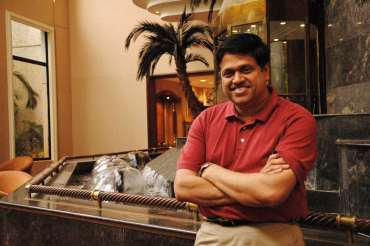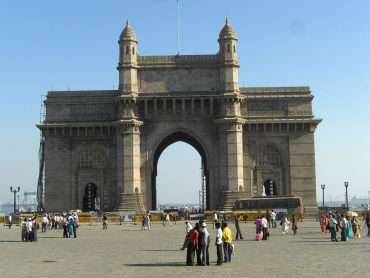Photographs: Sreeram Selvaraj Shobha Warrier
S. Somasegar, Senior Vice President, Developer Division, Microsoft Corporation was in India recently to sign a MoU with Anna University to start Microsoft's Innovation Lab, I-spark program, at the University.
In this Exclusive interview to rediff.com, he talks about many issues including the importance of innovation, entrepreneurship, the economic recession in the US, the emerging economies, etc.
What is the thought behind signing a MoU with Anna University to start an innovation centre?
If you go back 9-10 years, the IT industry was less than one per cent of the country's GDP and in the last 5-6 years, it has grown to 5.6 per cent of the country's GDP.
With this kind of growth, I think IT can be an economic driver for a country like India.
But when you look at from where the growth is coming, you will see that it is all from IT services. There is no doubt of the fact that India is the capital of IT services. That is a fantastic accomplishment by the country.
Having said that, I would say that IT services can have only linear growth while IP, innovation and products have non-linear growth.
To me, the real breakthrough comes when you can innovate and produce a brand new product for which everybody in the world would be willing to pay.
...
IT can be India's economic driver
Image: Without innovation, we will not get to the top, says Somasegar.How important is innovation for the growth of an economy?
I would say innovation is the backbone of an economy. It is like this: India will survive as a country with or without innovation. If India aspires to be the next super power in the information economy world, innovation is a must. Without innovation, we will not get to the top.
I don't know which country will get to the top but I know it will not be decided in the next 4-5 years; we will know it only in the next 20-30-40 years' journey.
That is why I feel we need to do something today so that 20 or 30 years from now, we will see the fruits.
Is China ahead of India in innovation?
I will say that India and China are a lot similar but in different ways. Similar in the sense that both countries have huge amounts of people or human talent which is important for information economy.
...
IT can be India's economic driver
Image: China believes in investing in infrastructure first.But the way of governance is done, it is very different and each has its pros and cons.
I would say both the countries have the opportunities and potential and I want to see both will make it or one of them. It will be fascinating to see how these countries fare in the next decade or so.
Microsoft has offices in China and India. How do you compare the working atmospheres of both countries?
I will tell you a story first. There is an IT Park near Shanghai. I went there 5-6 years ago. At that time Microsoft had presence in Beijing but nothing in Shanghai.
I wanted to set up an R&D centre but was not sure whether in Beijing or Shanghai.
Then, a guy took me to this IT Park. The park was fully ready with wireless connection, incredible 4-lane roads and next to the park, land for the universities to set up research centres. Everything was there.
When I asked about the companies that were there, I was told the park was empty as it was only just built.
They believe in investing in the infrastructure first and then inviting companies. That is the biggest difference between India and China.
...
IT can be India's economic driver
Image: Many companies are moving to cheaper destinations like Manila, pictured above.From the perspective of the availability of talent, India is slightly ahead of China. Thanks to the British, language is not an issue here.
Those who come out of Indian colleges have this natural advantage to join a global company. That is where the Chinese are slightly behind. Make no mistake they are getting there as fast as they can.
We have to wait for some more time to know which country will surge ahead.
Of late, many IT service companies are moving from India to less expensive destinations like Eastern Europe, Philippines, etc. so that they can globally competitive. So, is it really a good move to rely only on IT services?
There is no harm in relying too much on services. That is because IT services as an industry is here to stay. It is true that cost economy will come to play a role.
If a situation comes when doing business in India is so much more expensive than some other place where there is talent, companies will naturally go there.
...
IT can be India's economic driver
Image: The buzz word today is Cloud Computing.The thing I feel bad about is, if 10-20 years from now, we remain only IT service leaders and nothing else. I would say then that we missed a big opportunity.
Which are the other areas in the industry that India should be seriously looking at and developing?
The buzz word today is Cloud Computing and I would say 'cloud' is here to stay. In the next 20-30 years, the world is going to move more and more to web and cloud whether you are a consumer or a business person.
And, we have barely scratched the surface. The reason for this is two fold. One is, there is a huge installed base of IT applications that people are running on premise environment.
Before they take the big step towards the cloud, everybody wants to figure out what it means to him. They want to know how they can move all that they have built over the years to cloud.
...
IT can be India's economic driver
Image: Microsoft is a great example of public cloud, he says.The second issue is, people are worried about security and privacy in the cloud.
So, it is going to take a while for the large enterprises and government to be able to fully trust some other cloud provider.
Is the scenario same all over the world?
Yes, everywhere, it is the same. It is a little bit more in India than other countries. That is because of the controls we had in the financial system and the security we had in the airports.
We have had more controls than some other parts of the world. You talk to any government in the world, the issues are the same.
They call it data sovereignty.
But we at Microsoft feel that more and more people are going to move to public cloud. At the same time, in the next 20-30 years, large enterprises and governments may opt for private cloud for that extra comfort and security feeling.
Amazon and Microsoft are great examples of public cloud. We at Microsoft also give private cloud. And if someone wants to move from public cloud to private, it is possible.
Vice versa also.
IT can be India's economic driver
Image: Amazon is another great example of public cloud, says Somasegar.Where does India stand as far as cloud computing is concerned?
In the past, if you are sitting in India and building an application, unless you are one of the big guys, you have to work with the local companies. Access to customers was difficult but cloud eliminates all that barriers.
You can sit in Chennai, put an app on the cloud and a guy sitting in Brazil can access it.
With Cloud, the world will become your customer base, no matter who you are or where you are.
This is a huge opportunity which I think the software ecosystem in India is going to be excited about.
We are off to a good start but have I seen a Cloud App that is a killer? I am doubtful.
Let us go back to the Innovation lab Microsoft has started at Anna University. Why is it that India is lagging behind, say, a country like the US, creating innovators and entrepreneurs? Is it because of the attitude or the education system?
Multiple things come into play in creating entrepreneurial spirit. Silicon Valley is looked upon as the hot bed of innovation. Israel is another hot bed of innovation.
In fact, outside US, the country that has the most number of start ups on the per capita basis, that is listed at NASDAQ, is Israel.
It is a small country but something about it makes people become entrepreneurs.
IT can be India's economic driver
Image: Sites such as Facebook have increased awareness among students.In India, 10 years ago, if you had asked engineering students what they wanted to be, they only wanted to be a part of an Infosys or a TCS or a Wipro.
But today at least 30-40 per cent of them want to do something of their own. They want to give it a try. It is very encouraging.
What is the reason behind this change?
The notion that we can also do it! It is also like I have the same opportunities as anybody else in the world. I have an idea and the world is my customer base, so let me do it.
It is more due to exposure due to the Facebook's and LinkdIn's of the world.
The students today are more entrepreneurial than ever before. I also want to give the credit to the education system.
Having said that, many additional infrastructure needs to be in place. I don't think it is in place in India.
I will give you an example. The amount of VC (venture capitalists) activity in India is growing and money is not an issue.
The question is, how do you bring the kids and VCs together effectively?
...
IT can be India's economic driver
Image: Microsoft makes more than half of its revenue from outside the US.Do you think the US became the world's largest economy because it encouraged entrepreneurship?
In the last 100 years, yes, it has encouraged entrepreneurship. The notion of innovation and IP protection is very, very strong in the US.
The number one reason why the US is where it is today is because of the focus on R&D and entrepreneurial spirit.
As a corporate entity, how worrisome is it for you that the US is still in recession?
Most companies in the US do not think of the US alone as their market.
For example, Microsoft makes more than half of its revenue from outside the US. Only less than half of our revenue comes from the US.
All of us think global.
When the recession started in 2008, we thought it was a global economic downturn.
There was a dip all over the world but then what happened was some countries like India - the emerging market countries - recovered very fast.
They just snapped back in no time while some of the developed countries like the US are slowly inching their way back.
But the rate of growth is nowhere near what it was in 2008.
...
IT can be India's economic driver
Image: India will be in the top five, says Somasegar.Since we focus on other countries like India, China, etc, we feel life is good. IT spending is good. Year over year our revenue is growing.
The truth is, if you want to have good growth, you have to have your footprint in different parts of the world.
Do you think the dominance of the US economy is over and some other super power will emerge soon?
If you take the GDP growth, the number one country is even now the US. For the last many, many years, the number two position was held by Japan but now, China is in that position.
If you talk to the financial pundits, they say in the next 20 years, if the China growth rate continues at the current level, and the US growth rate remains at the current level, there is a possibility that China may overtake the US economy and become the world's largest economy.
Things can change. Those at the top today may not be at the top tomorrow. When will it happen, nobody knows. But the next 50 years is going to be interesting.
Where will India be?
India has the potential to be one of the largest economies in the world in the next 50 years. The question is can we seize the opportunity?
A number of things have to change. For example, can a country that is so low on corruption index be at the top?
I feel India will be in the top 5, but at the top? I don't know.











article